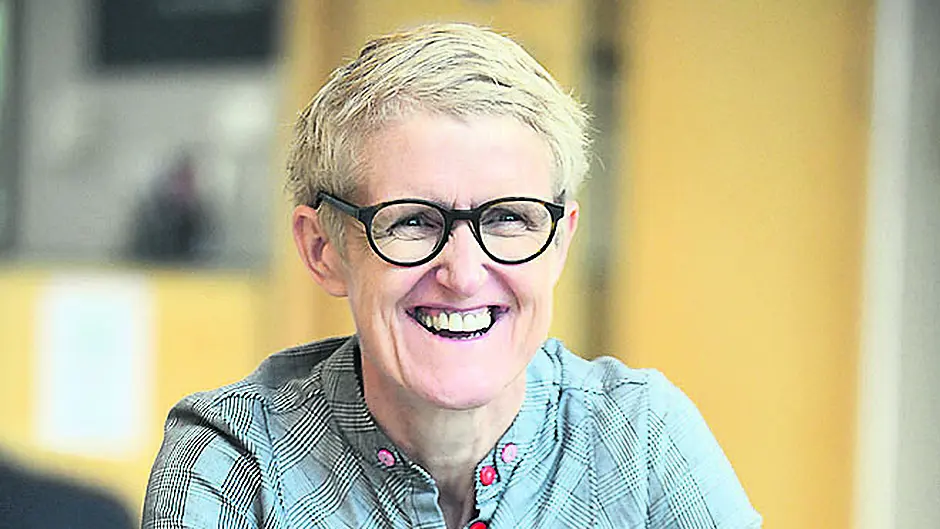A West Cork-born scientist, who led a recent ground-breaking study in the UK that found Hormone Replacement Therapy (HRT) could help prevent Alzheimer’s in at-risk women, says we should all be paying much more attention to what we eat
WHAT we eat can add 10 years to our life expectancy and the good news is that it’s never too late to start making positive changes.
That’s according to West Cork’s Professor Anne-Marie Minihane, who made global headlines recently for leading a study which found that Hormone Replacement Therapy (HRT) could help prevent Alzheimer’s Disease among women at risk of developing the disease.
Originally from Cunnamore outside Skibbereen, Anne-Marie is professor of nutrigenetics at Norwich Medical School, and the director of the Norwich Institute for Health Ageing at the University of East Anglia.
The groundbreaking study she led found that HRT use is associated with better memory, overall cognition and larger brain volumes in later life among women carrying the APOE4 gene – a gene carried by a quarter of the global population and which is the strongest risk factor gene for Alzheimer’s disease.
The research team found that HRT was most effective when introduced early in the menopause journey during perimenopause.
The team studied data from 1,178 women participating in the European Prevention of Alzheimer’s Dementia initiative – which was set up to study participants’ brain health over time.
Anne Marie said the study is really important because there have been very limited drug options for Alzheimer’s disease for 20 years and there is an urgent need for new treatments and preventive strategies.
‘It’s still too early to say for sure that HRT reduces dementia risk in women, but our results highlight the potential importance of HRT and personalised medicine in reducing Alzheimer’s risk.
‘The next stage of this research will be to carry out an intervention trial to confirm the impact of starting HRT early on cognition and brain health. It will also be important to analyse which types of HRT are most beneficial,’ she added. Anne-Marie said the menopausal transition, which takes on average seven years, and the early post-menopausal period of five to six years, is a real window of opportunity for women to make a big difference to their long-term health.
 Hand of doctor with two injection vials for treatment with Testosterone and Estrogen hormones. Doctor With bottles for Testosterone and Estrogen hormonal balance therapy
Hand of doctor with two injection vials for treatment with Testosterone and Estrogen hormones. Doctor With bottles for Testosterone and Estrogen hormonal balance therapy
‘It seems what we do in this period is critical to us ageing well. Even if we don’t know yet with complete certainty about HRT and cognitive (brain) health, we do know
that eating berries, green leafy veg (cabbage, kale, lettuces, broccoli spinach) and omega-3 fats found in oily fish are particularly beneficial for cognitive health,’ she said.
‘There’s a lot known now about the gut-brain axis and what’s good for your gut is certainly good for your brain, so women as they transition though the menopause should also have plenty of fibre from sources such as wholegrains.’
The menopause transition is associated with deficits in mood and anxiety, which are detrimental for both long term and cognitive health, she said.
‘So anything that will help keep anxiety levels down is very important and all the foods I mentioned will also help this.’
Anne-Marie is also involved in extensive research on the Mediterranean diet and is carrying out a medical trial on its impact on brain health shortly. ‘You might think this diet isn’t applicable to Ireland and England but it’s really just a healthy version of the Irish or English diet.
‘It’s anything that is whole plant based – processed plant foods are not as good for us – but legumes, nuts, fruits and veg are all very beneficial for cognitive health, mood and anxiety.
‘Even over the course of a day what we eat can have a huge effect, but over the course of a lifetime it can make a difference of probably about 10 years to your life expectancy,’ said Anne-Marie.
Having lived in Norwich full-time since 2010, she says she now feels equally at home in the UK as she does in West Cork where she has a house, and she gets back to visit mum Mary and the rest of the family as often as she can.
Both her mum, and her late dad Cliffy, the headmaster in Kilcoe NS, where she attended, were always very encouraging of her career.
‘In Mercy Heights in Skibbereen, there were also great opportunities to study the sciences,’ she remembers.
For those curious, her own diet is refreshingly relatable. Her breakfast is Weetabix, granola and fruit and fibre, with chopped fruit and natural yoghurt and milk.
 Anne-Marie is also involved in extensive research on the Mediterranean diet and is carrying out a medical trial on its impact on cognitive health shortly. (Photo: Shutterstock)
Anne-Marie is also involved in extensive research on the Mediterranean diet and is carrying out a medical trial on its impact on cognitive health shortly. (Photo: Shutterstock)
‘Lunch is probably my unhealthiest meal of the day, a sandwich or salad; my partner
Lisa is a fantastic cook so dinner could be all kinds of every- thing, but we’d only eat meat once a week, and try to include fish once or twice,’ she said.
She runs for 45 minutes three times a week, doesn’t drink alcohol these days, is a big tea drinker, but has a very sweet tooth.
‘I always say that if you can take care of what you do Mon
day to Friday and treat yourself at the weekend, that’s a good balance,’ she suggested.






